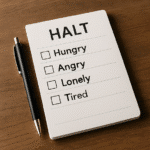There are many ways that people have of dealing with their emotions, some being better outlets than others. When you turn to food to deal with your feelings, this type of emotional eating can quickly become an unhealthy cycle. Stress can cause triggers in your body that may leave you looking for ways to satisfy these negative feelings. Some people will turn to food as a comfort and a way to mask these feelings. This type of emotional eating can feel satisfying at the time, only to leave you feeling guilty and frustrated in the aftermath.
It is important to find healthy ways to manage your feelings, as opposed to turning to food when things are tough. Finding that outlet to manage your stress and address your feelings can go a long way to ending the emotional eating cycle. This may be as simple as taking a walk, talking with friends, or spending time with a pet. A therapist can also help you to find better ways to manage these feelings, keeping you from turning to food for emotional support when things are difficult.
Causes of Emotional Eating
When your stress levels are at their highest your body will release the stress hormone cortisol. Cortisol can trigger cravings for salty, sweet, and fried foods. Your mind will trick you into craving these foods thinking that this is what you need, even when you aren’t hungry. Since you are eating mostly unhealthy foods without your body signaling that you need the calories, this cycle can often lead to weight gain. This can lower your self-esteem and put even more stress on your mental health.
People who are unable to manage their negative feelings, whether sadness, anger, guilt, or some other emotion, in a healthy manner often turn to any consolation they can get. For some this can become food, seeking comfort and the ability to numb these feelings through eating. Others may turn to emotional eating to suppress boredom and feelings of emptiness. While this may work in the short run, you will likely end up with feelings of guilt and regret.
In some cases, the cycle of emotional eating can stem back to childhood. If all your good memories were centered around food the subsequent emotions that you had at the time, these eating habits can be difficult to change in adulthood.
How to Stop the Cycle of Emotional Eating
Keeping track of your emotional eating with a diary can help to identify the life events that are triggering food as a coping mechanism. Once you have identified the triggers, you can work to find healthier outlets to handle these emotions when they occur. It can be helpful to talk to a trained therapist about your emotional eating. By working with a professional, you can work together to find proper outlets for handling these emotions in a way that will not be detrimental to your mental or physical health.





